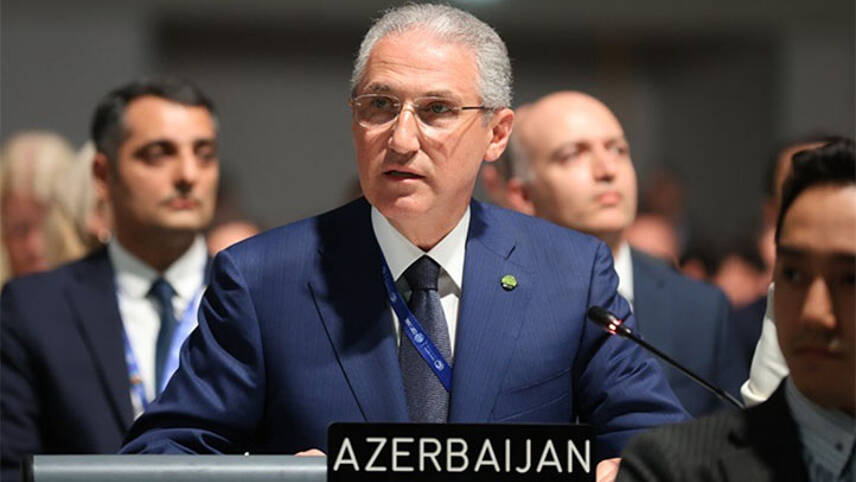Register for free and continue reading
Join our growing army of changemakers and get unlimited access to our premium content

The Presidency has urged parties to establish National Adaptation Plans (NAPs) by 2025.
Today (25 April), at the Petersberg Climate Dialogue in Berlin, Babayev stated a resolute commitment to the goals of the Paris Agreement, stating that a failure to meet the 1.5C goal “means that people would be left behind.”
It was revealed earlier this year that global warming surpassed the 1.5C temperature threshold for the first time in recorded history for whole 12 months.
In his address, Babayev emphasised that meeting the temperature target isn’t solely about yearly fluctuations but rather about longer-term trends.
He added: “Currently, we are on course to overshoot the 1.5 limit in the medium term. However, the science also says that, with determination and urgency, it is still possible to stay below this limit.”
The Presidency is calling on world leaders to deliver on their previous commitments, while introducing a plan for climate action that is structured around two pillars: planning and finance.
The first pillar emphasises the need to provide support that facilitates the development and execution of next-generation national plans for economy-wide emissions reductions, called Nationally Determined Contributions (NDCs), aligning with the 1.5C target of the Paris Agreement while considering unique national circumstances.
Babayev has announced that Azerbaijan, a major oil and gas exporter, is working on submitting its own 1.5C aligned NDC, in order to “lead by example”.
Additionally, the Presidency has urged parties to establish National Adaptation Plans (NAPs) by 2025, identifying medium- and long-term adaptation needs informed by the latest climate science.
Furthermore, the plan supports the delivery of Biennial Transparency Reports (BTRs) as crucial mechanisms for tracking climate progress through emissions inventories, progress overviews and investment insights.
COP29 will organise a series of workshops in May to support parties in delivering their first BTRs by the end of this year.
Presidency plan for global climate finance
The second pillar highlights the indispensable role of finance in emission reduction, climate adaptation and addressing loss and damage.
Babayev said: “At COP29, we need to agree a new climate finance goal. This goal will play a key role in our plan to build up momentum and mutually reinforcing action.”
In 2009, developed countries pledged to deliver $100bn of climate finance every year to nations on the frontlines of the climate crisis. This pledge was formally ratified in 2015; however, the full $100bn per year has not yet been delivered in any given year.
Earlier this month, a coalition of leading industry voices wrote a letter International Monetary Fund (IMF) and World Bank to change their financial systems for mitigating the climate crisis while solving the global debt, as research revealed that developing countries will be unable to meet their net-zero targets due to piling debt.
In order to achieve the UN’s sustainable development goals (SDGs), the world needs to mobilise $5.4trn a year by 2030, according to the UN. However, there is currently a $3trn shortfall due to the present policies.
Nearly 60% of low-income countries are now in debt and they collectively spend six times more repaying their debt than what the World Bank lends in a year.
A week following the publication of the letter, the spring meetings of the IMF and World Bank took place in Washington. Babayev noted that although world leaders expressed significant concern and worry during the meetings, there was a lack of substantial action.
He said: “While we heard a great deal of concern and worry, we did not yet see adequate and sufficient action. That must change.”
Over the ensuing months, the COP29 Presidency will collaborate with various stakeholders, including parties, multilateral financial institutions, the private sector, financial services industry and philanthropic organisations, with an aim to mobilise climate finance more effectively and expedite investment towards climate resilience.
It bears noting that prior to his role as the Minister of Ecology and Natural Resources of Azerbaijan Republic, Babayev worked in the Department of Foreign Economic Relations of the State Oil Company of the Republic of Azerbaijan (SOCAR).
With Babayev as the President-Designate of COP29 and his ties to the oil sector, there are concerns that discussions reminiscent of Al Jaber’s COP28 presidency will resurface, focusing on the influence of fossil fuel industry participants in shaping the COP outcomes.


Please login or Register to leave a comment.